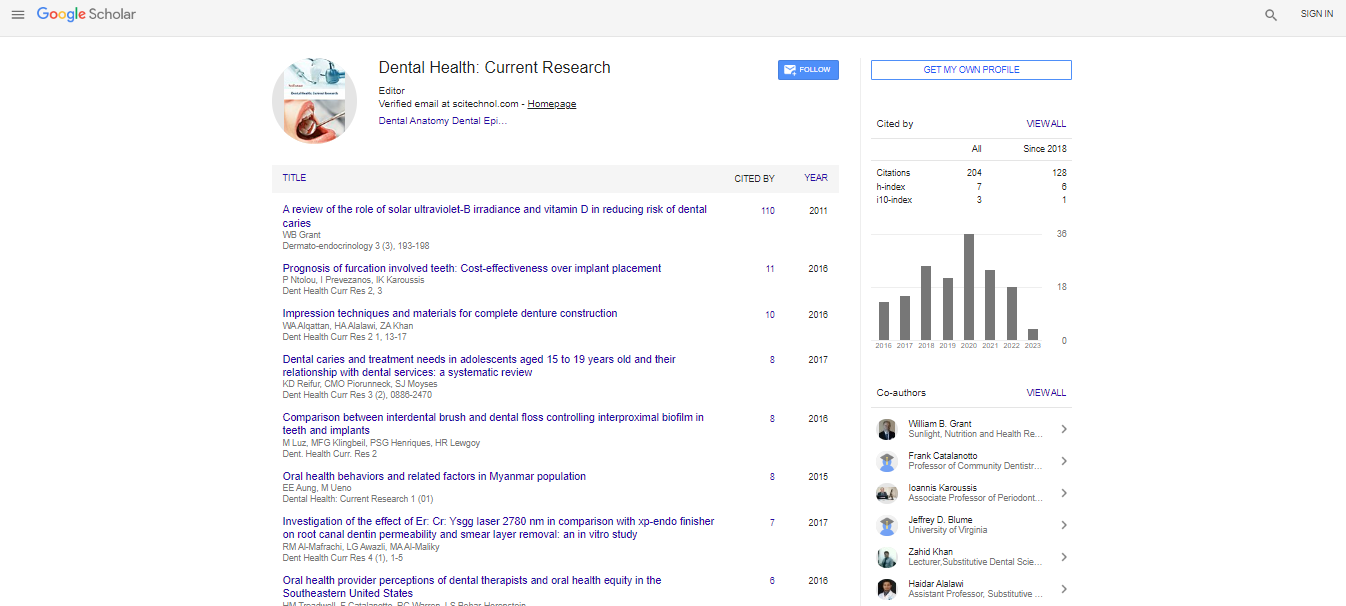Commentary, Dent Health Curr Res Vol: 10 Issue: 3
Calcium Supplementation for Stronger Teeth: Benefits and Considerations
Alanameel Esbhayat*
1Department of Periodontics and Community Dentistry, College of Dentistry, King Saud University, Riyadh 11545, Kingdom of Saudi Ara
*Corresponding Author: Alanameel Esbhayat,
Department of Periodontics and
Community Dentistry, College of Dentistry, King Saud University, Riyadh 11545,
Kingdom of Saudi Arabia
E-mail: alanameeles@gmail.com
Received date: 28 May, 2024, Manuscript No. DHCR-24-137156;
Editor assigned date: 30 May, 2024, Pre-QC No. DHCR-24-137156 (PQ);
Reviewed date: 14 June, 2024, QC No. DHCR-24-137156;
Revised date: 21 June, 2024, Manuscript No. DHCR-24-137156 (R);
Published date: 28 June, 2024, DOI: DOI: 10.4172/2470-0886.1000215
Citation: Esbhayat A (2024) Calcium Supplementation for Stronger Teeth: Benefits and Considerations. Dent Health Curr Res 10:3.
Description
Calcium is a vital mineral that plays a critical role in the development and maintenance of healthy teeth and bones. It is the most abundant mineral in the human body, with 99% of it stored in the bones and teeth. Calcium not only helps in the formation of tooth structure during development but also maintains the strength and integrity of teeth throughout life. This article explores the benefits of calcium supplementation for stronger teeth and the considerations necessary to maximize its effectiveness and safety.
During childhood, calcium is essential for the proper formation of teeth. It contributes to the mineralization of the tooth enamel, the hard outer layer that protects teeth from decay. Even after teeth have fully developed, calcium plays a vital role in maintaining the strength and hardness of enamel. A well-mineralized enamel surface is more resistant to cavities and wear. Teeth are anchored in the jawbone, which needs to be strong and healthy to provide proper support. Adequate calcium intake helps maintain bone density and prevent conditions like osteoporosis that can affect the stability of teeth. Calcium supplementation can provide several benefits for dental health, especially when dietary intake is insufficient.
Regular calcium supplementation can help maintain the density and resilience of tooth enamel, making it less susceptible to erosion and decay. Calcium supports not just the teeth but also the alveolar bone, which holds teeth in place. Strong alveolar bones reduce the risk of tooth loss and periodontal disease. Calcium needs are higher during periods of rapid growth, such as pregnancy and childhood. Supplementation during these times can ensure that both the mother and the developing child receive adequate calcium for healthy teeth and bones. As people age, their ability to absorb calcium can decrease. Supplementation can help older adults maintain optimal calcium levels, thereby supporting dental and bone health. While calcium supplementation can be beneficial, there are several considerations to ensure its safety and effectiveness:
The Recommended Daily Allowance (RDA) for calcium varies by age and sex. For most adults, the RDA is about 1,000 mg per day, increasing to 1,200 mg for women over 50 and men over 70. It's essential not to exceed the RDA without medical supervision, as excessive calcium intake can lead to kidney stones and other health issues. Calcium supplements come in various forms, including calcium carbonate and calcium citrate. Calcium carbonate is more commonly available and usually less expensive, but it should be taken with food for optimal absorption. Calcium citrate is more easily absorbed and can be taken on an empty stomach, making it a better option for individuals with lower stomach acid. Vitamin D is crucial for calcium absorption. Without adequate vitamin D, even high calcium intake might not be effective. Many calcium supplements include vitamin D, but it is also important to get it from sun exposure and dietary sources like fatty fish and fortified foods.
Supplementation should not replace a balanced diet. Dairy products, leafy green vegetables, nuts, and fortified foods are excellent dietary sources of calcium. A varied diet ensures that you get not only calcium but also other essential nutrients that support overall health. Before starting calcium supplementation, it's important to consult with a healthcare provider, especially for individuals with health conditions such as kidney disease or those taking medications that may interact with calcium supplements.
Conclusion
Calcium is indispensable for maintaining strong and healthy teeth, supporting the integrity of tooth enamel, and ensuring the stability of the jawbone. Calcium supplementation can be an effective strategy to prevent deficiencies and support dental health, especially when dietary intake is inadequate. However, it is important to consider the appropriate dosage, type of supplement, and the need for complementary nutrients like vitamin D to ensure optimal benefits. By integrating calcium supplementation with a balanced diet and professional medical advice, individuals can achieve and maintain excellent oral health throughout their lives.
 Spanish
Spanish  Chinese
Chinese  Russian
Russian  German
German  French
French  Japanese
Japanese  Portuguese
Portuguese  Hindi
Hindi 